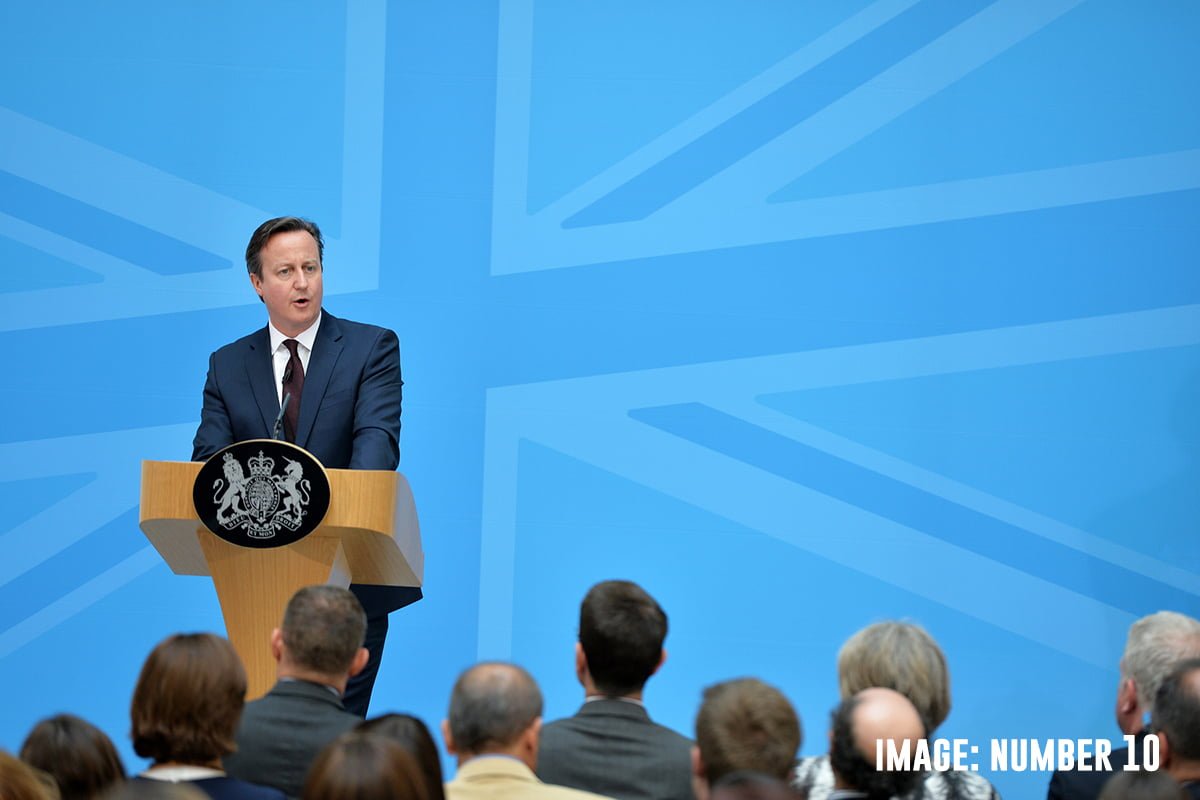“A strain of collective madness has descended over the Conservative party in recent days…” states an editorial in the Financial Times. The split within the Tory Party has turned into a chasm and is a stark reflection of the deepening crisis of British capitalism. The wind always blows the tops of the trees first, stated Trotsky. In the past, the British establishment boasted of having the most successful conservative party in Europe. Not any more. Rob Sewell looks at the increasing political tensions within the Tories.
“A strain of collective madness has descended over the Conservative party in recent days…” states an editorial in the Financial Times. The split within the Tory Party has turned into a chasm and is a stark reflection of the deepening crisis of British capitalism. The wind always blows the tops of the trees first, stated Trotsky. In the past, the British establishment boasted of having the most successful conservative party in Europe. Not any more.
The attacks on David Cameron’s leadership have become increasingly vicious. His attempts to modernise the party and distance it from Thatcherism with support for gay marriage and wind farms have provoked an almighty backlash. Euroscepticism has re-emerged with a vengeance within the Tory Party, forcing Cameron to make promises about a future referendum on Europe. But this has far from quenched the thirst of the anti-Europeans, who are infuriated by the leadership.
The ploy has also failed to stem the rise of UKIP, which threatens to damage the Tories electorally.
The crisis in the Tory party is such that Cameron has been accused of “losing control” by Tory Grandee Lord Howe: “The ratchet effect of euroscepticism has now gone so far that the Conservative leadership is in effect running scared of its own backbenchers”. This followed a threat from two Cabinet Ministers, Michael Gove and Philip Hammond who said they would vote to leave the EU if a referendum was held tomorrow. They are clearly lining themselves up for a challenge for the leadership. Up to a third of Conservative MPs are now said to want Britain to leave the EU, which has alarmed sections of big business, as well as the Americans.
The grass roots of the Tory party, the backwoodsmen and women, have felt betrayed and alienated by the leadership. 30 local Tory chairmen and former chairmen have delivered a letter to No.10 warning about Cameron’s “failure to listen” to the Tory ranks. The leaked remark by a number 10 insider that the Tory members were “mad, swivel-eyed loons”, while being accurate, was nevertheless deeply offensive and will not have helped the situation.
Rebels
Tory rebels have voted in droves against the leadership in recent months. 114 voted to include a referendum in the Queen’s speech, while 133 voted against gay marriage. According to studies, this is the most rebellious backbench of any party since the Second World War.
They are unwilling to be placated. Nothing will satisfy them. “We can keep throwing red meat at the crocodiles but, if they want to eat the prime minister, there’s not a lot we can do”, explained one Tory minister.
This could not have come at a worse time for the ruling class. They want a strong government to continue with its austerity programme. But Cameron’s personal rating is minus 21 and Clegg’s is minus 37.
In a desperate attempt to find extra cuts as borrowing is pushed up, George Osborne has said seven government departments have agreed to cut their budgets by up to 10% as part of the spending review designed to achieve savings of £11.5bn in 2015-16.
With a month to go before he needs to announce the final cuts, Osborne said he was “about 20% of the way there”. This is the most draconian austerity regime ever imposed in the modern era. It is the real meaning of capitalist crisis. British people have become poorer than their counterparts in a host of developed countries, sliding from fifth to 12th on a global list of disposable incomes. But there is far more to come.
Hopes
The Tory leadership and the bosses have put all their hopes on an economic recovery. Mervyn King, the governor of the Bank of England, in his farewell message forecast that growth would “strengthen”. But this is far fetched. The British economy remains in crisis, nearly 4% below its pre-crisis peak in terms of output. Unemployment is on the rise while under-employment (those in part-time work wanting a full-time job) is also growing. Marcus Bullus, trading director at brokers MB Capital said about King’s remarks, “He assured us once again that the, ‘recovery is in sight’. It is, if you are peering through the Hubble space telescope. The UK’s meager rates of growth only look good compared with the triple-dip recession being endured across the Channel.”
As support for the Coalition shrinks, everything now points to a defeat for the government in 2015. The only problem is that Labour is harking back not to Keir Hardie, but to Disraeli and “One Nation” Toryism.
With the deepest crisis of capitalism in its history, and increasing hatred for the money-grabbing bankers and capitalist corporations, instead of offering a socialist alternative, Ed Miliband is offering “responsible” capitalism. In fact, when Google’s executive chairman, Eric Schmidt, defended his company’s tax avoidance as “just capitalism”, he was telling the truth. His job was to maximize the profits for his shareholders, nothing more. But Miliband, instead of using this to denounce capitalism, said, “I disagree.” Google’s actions were simply wrong and they should pay a level tax as part of “responsible capitalism” he hopes.
Disaster
This attempt to manage capitalism in crisis is a road to disaster. It will mean following the dictates of the banks and big business that want to place the burden of their crisis on the backs of the working class. Millions, who are outraged by the attacks of the Coalition, will be looking to Labour for real change, and not more of the same.
This means the adoption of a socialist programme to put an end to the nightmare of capitalism. Only by taking over the commanding heights of the economy, by nationalizing the top 150 monopolies, banks and insurance companies, under democratic workers’ control and management, can society be run in the interests of the majority and not the profits of the few. This was the original aim of the Labour and trade union movement. It remains the only real alternative to mass unemployment, attacks on living standards and endless austerity.






